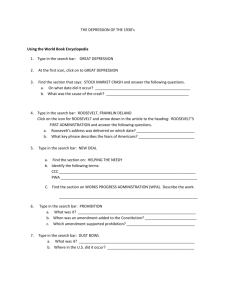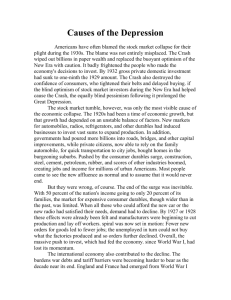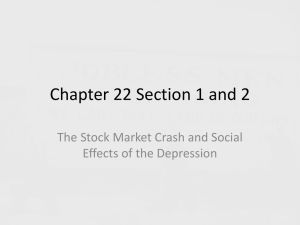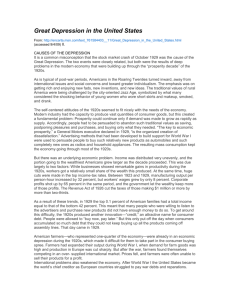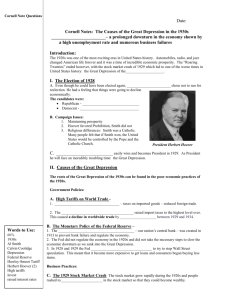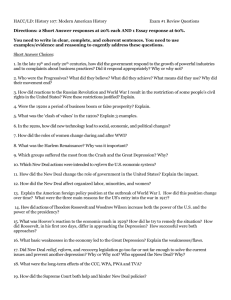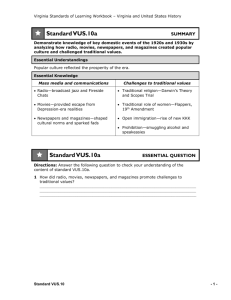SOL 9 & 10 Review Sheet (2008) - Fredericksburg City Public Schools
advertisement
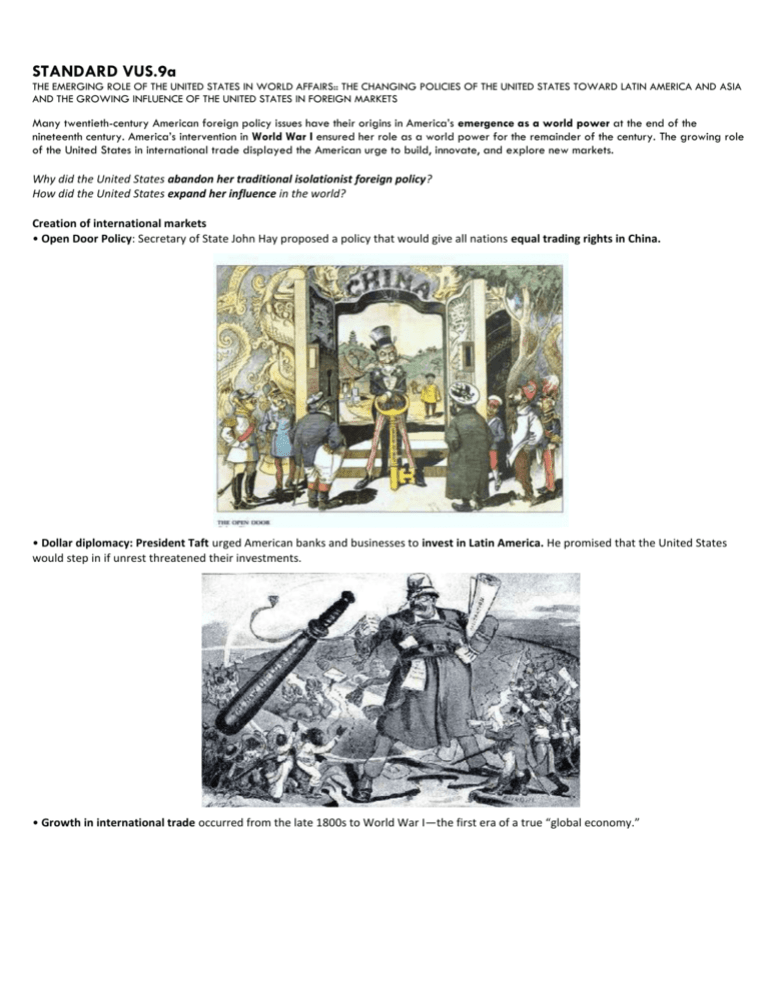
STANDARD VUS.9a THE EMERGING ROLE OF THE UNITED STATES IN WORLD AFFAIRS:: THE CHANGING POLICIES OF THE UNITED STATES TOWARD LATIN AMERICA AND ASIA AND THE GROWING INFLUENCE OF THE UNITED STATES IN FOREIGN MARKETS Many twentieth-century American foreign policy issues have their origins in America’s emergence as a world power at the end of the nineteenth century. America’s intervention in World War I ensured her role as a world power for the remainder of the century. The growing role of the United States in international trade displayed the American urge to build, innovate, and explore new markets. Why did the United States abandon her traditional isolationist foreign policy? How did the United States expand her influence in the world? Creation of international markets • Open Door Policy: Secretary of State John Hay proposed a policy that would give all nations equal trading rights in China. • Dollar diplomacy: President Taft urged American banks and businesses to invest in Latin America. He promised that the United States would step in if unrest threatened their investments. • Growth in international trade occurred from the late 1800s to World War I—the first era of a true “global economy.” Latin America • Spanish American War – Puerto Rico was annexed by the United States. – The United States asserted her right to intervene in Cuban affairs. • Panama Canal and the role of Theodore Roosevelt – The United States encouraged Panama’s independence from Colombia. – The parties negotiated a treaty to build the canal. Asia and the Pacific • Hawaii: U.S. efforts to depose Hawaii’s monarchy; U.S. annexation of Hawaii • Philippines: Annexed after the Spanish American War Open Door Policy: Urged all foreigners in China to obey Chinese law, observe fair competition STANDARD VUS.9b UNITED STATES INVOLVEMENT IN WORLD WAR I, INCLUDING WILSON’S FOURTEEN POINTS, THE TREATY OF VERSAILLES, AND THE NATIONAL DEBATE OVER TREATY RATIFICATION AND THE LEAGUE OF NATIONS. While American entry into World War I ensured Allied victory, the failure to conclude a lasting peace left a bitter legacy. Why did the United States become involved in World War I? How did visions of the postwar world differ? United States involvement in World War I • The war began in Europe in 1914 when Germany and Austria-Hungary went to war with Britain, France, and Russia. • For three years, America remained neutral, and there was strong sentiment not to get involved in a European war. • The decision to enter the war was the result of continuing German submarine warfare (violating freedom of the seas) and American ties to Great Britain. • Americans wanted to “make the world safe for democracy.” (Woodrow Wilson) • America’s military resources of soldiers and war materials tipped the balance of the war and led to Germany’s defeat. Fourteen Points • Wilson’s plan to eliminate the causes of war • Key points -- Self-determination – Freedom of the seas – League of Nations – Mandate system Treaty of Versailles • The French and English insisted on punishment of Germany. • A League of Nations was created. • National boundaries were redrawn, creating many new nations. League of Nations debate in United States • Objections to United States foreign policy decisions being made by an international organization, not by U.S. leaders • The Senate’s failure to approve the Treaty of Versailles STANDARD VUS.10a DOMESTIC EVENTS OF THE 1920S AND 1930S: RADIO, MOVIES, NEWSPAPERS, AND MAGAZINES CREATED POPULAR CULTURE AND CHALLENGED TRADITIONAL VALUES Popular culture reflected the prosperity of the era. How did radio, movies, newspapers, and magazines promote challenges to traditional values? Mass media and communications • Radio: Broadcast jazz and Fireside Chats • Movies: Provided escape from Depression-era realities • Newspapers and magazines: Shaped cultural norms and sparked fads Challenges to traditional values • Traditional religion: Darwin’s Theory, the Scopes Trial • Traditional role of women: Flappers, 19th Amendment • Open immigration: Rise of new Ku Klux Klan (KKK) • Prohibition: Smuggling alcohol and speakeasies STANDARD VUS.10b THE CAUSES AND CONSEQUENCES OF THE STOCK MARKET CRASH OF 1929 The United States emerged from World War I as a global power. The stock market boom and optimism of the 1920s were generated by investments made with borrowed money. When businesses failed, the stocks lost their value, prices fell, production slowed, banks collapsed, and unemployment became widespread. What caused the stock market crash of 1929? Causes of the stock market crash of 1929 • Business was booming, but investments were made with borrowed money (over-speculation). • There was excessive expansion of credit. • Business failures led to bankruptcies. • Bank deposits were invested in the market. • When the market collapsed, the banks ran out of money. What were consequences of the stock market crash of 1929? Consequences of the stock market crash of 1929 • Clients panicked, attempting to withdraw their money from the banks, but there was nothing to give them. • There were no new investments. STANDARD VUS.10c THE CAUSES OF THE GREAT DEPRESSION AND ITS IMPACT ON THE AMERICAN PEOPLE. The Great Depression caused widespread hardship. What were the causes of the Great Depression? Causes of the Great Depression • The stock market crash of 1929 and collapse of stock prices • Federal Reserve’s failure to prevent widespread collapse of the nation’s banking system in the late 1920s and early 1930s, leading to severe contraction in the nation’s supply of money in circulation • High protective tariffs that produced retaliatory tariffs in other countries, strangling world trade (Tariff Act of 1930, popularly called the Hawley-Smoot Act) How did the depression affect the lives of Americans? Impact of the Great Depression • Unemployment and homelessness • Collapse of the financial system (bank closings) • Decline in demand for goods • Political unrest (growing militancy of labor unions) • Farm foreclosures and migration STANDARD VUS.10d FRANKLIN D. ROOSEVELT’S NEW DEAL RELIEF, RECOVERY, AND REFORM MEASURES ADDRESSED THE GREAT DEPRESSION AND EXPANDED THE GOVERNMENT’S ROLE IN THE ECONOMY. The New Deal permanently altered the role of American government in the economy. It also fostered changes in people’s attitudes toward government’s responsibilities. Organized labor acquired new rights, as the New Deal set in place legislation that reshaped modern American capitalism. How did the New Deal attempt to address the causes and effects of the Great Depression? What impact did the New Deal have on the role of the federal government? New Deal (Franklin Roosevelt) • This program changed the role of the government to a more active participant in solving problems. • Roosevelt rallied a frightened nation in which one in four workers was unemployed. (“We have nothing to fear, but fear itself.”) • Relief measures provided direct payment to people for immediate help (Works Progress Administration—WPA). • Recovery programs were designed to bring the nation out of the depression over time (Agricultural Adjustment Administration—AAA). • Reform measures corrected unsound banking and investment practices (Federal Deposit Insurance Corporation—FDIC). • Social Security Act offered safeguards for workers. The legacy of the New Deal influenced the public’s belief in the responsibility of government to deliver public services, to intervene in the economy, and to act in ways that promote the general welfare.
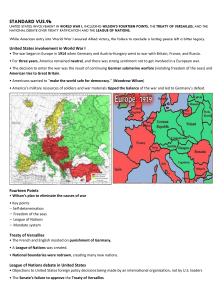
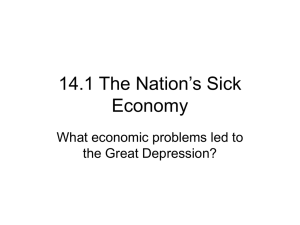

![SOL_Review_Unit_10_2010[1]](http://s3.studylib.net/store/data/007061648_1-0ff216384ad704ee70792621670387e7-300x300.png)
